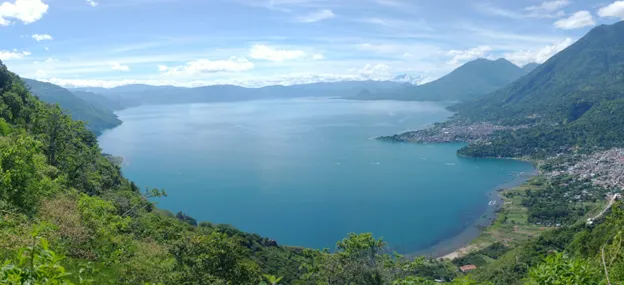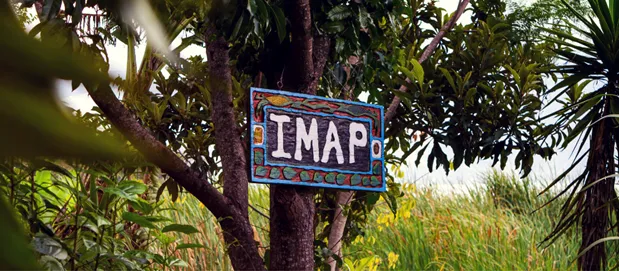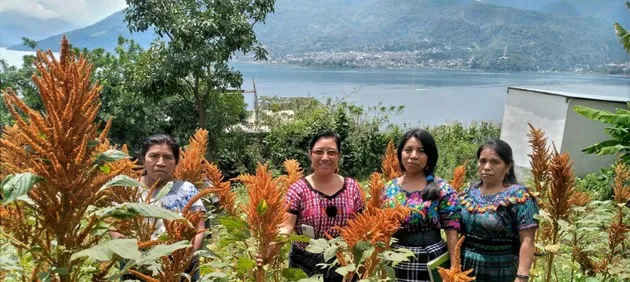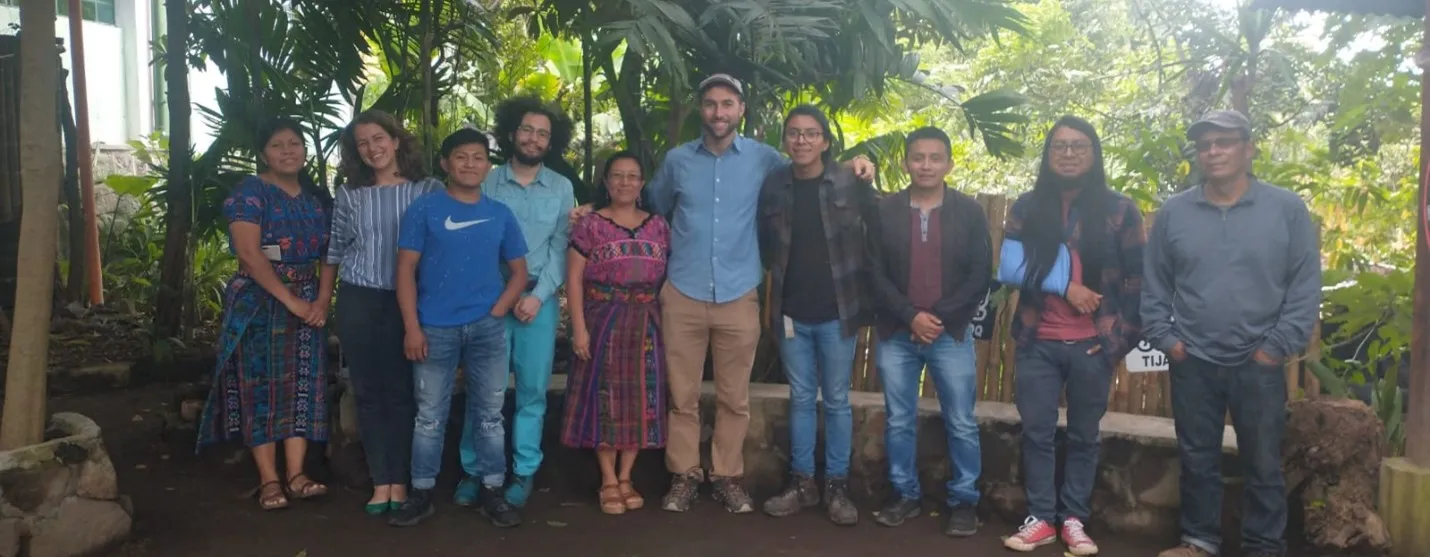By Chris Destiche

In the Western Highlands of Guatemala, nestled at the foot of a volcano on the shores of a high-altitude lake, a group of farmers is working to change the world, one seed at a time. The indigenous-run and owned Mesoamerican Permaculture Institute (IMAP) combines traditional ecological knowledge and permaculture practices to promote local food sovereignty, biodiversity, and cultural preservation. They work with local Maya Kaqchikel community members to conserve and propagate native and heirloom seed varieties through a community seed bank while also promoting sustainable, climate-resistant agricultural techniques.
I had the good fortune of spending 3 months this summer conducting qualitative research with the institute and its farmers, and through my interviews, I found they also view themselves as part of a growing resistance movement. Through permaculture, they aim to empower small-scale campesino farmers to become independent from the global agricultural regime that is exploiting them. For the technicians at IMAP, agriculture is both an act of rebellion and an act of self-preservation.

*photo taken by Patrik Mucia Goz of IMAP and used here with his expressed permission
A history of extractivism
To understand the forces that IMAP is trying to resist, it helps to know the background history of industrial agriculture. Shortly after World War II, green revolution technology was widely adopted as the dominant form of agriculture across the globe. While the transition increased food production, it also produced serious negative externalities, damaging both human and environmental health, and greatly contributing to resource extraction as well as climate change. It also stripped many communities in the global south of their control over their food production and right to self-determination, arguably increasing food insecurity and inequality across the world.
This was especially the case in Guatemala, where a US-backed coup put leaders in place that were favorable to US industry, especially big agribusiness. With the backing of the government as well as neoliberal development policies and practices that preferenced expensive mechanized agriculture over traditional methods, large farms with capital outcompeted small farmers, and wealthy landowners began to buy up and consolidate land ownership.
As small-scale, often indigenous farmers in Guatemala struggled to compete with economic elites, they have fallen into cycles of debt and migration over generations that have slowly led to their displacement and dispossession. Farmers who are able to survive become increasingly dependent on expensive inputs from agribusiness to keep their production high. (I have summarized complex issues that warrant more space than can be provided here. For further explanation of the intricacies of how US agribusiness has marginalized Guatemalan farmers, I suggest this article by UA alum Dr. Richard Johnson. For a deep dive about US imperialism, the coup and how Guatemala got to where it is, read “Bitter Fruit.”
Operating from a different ontology
I first learned of the institute as a bright-eyed Peace Corps volunteer working with a women’s group on an economic empowerment project centered around agriculture. We came to the institute to receive a training on sustainable agriculture and left with a history lesson. The technicians explained how their ancestors wove the Mayan Cosmovision into everything they did and used ingenious farming techniques that produced food in ways that were good for both humans and the environment. They explained how the Mayan ritual calendar interacted with the agricultural one, and how the different phases of the lunar cycle affected where the “energy” of the plant was, which dictated when to do certain activities like planting and harvesting. In promoting their form of agriculture, they were also rescuing ideas and a culture that had been denigrated and devalued since the time of the conquest.

*Photo taken by Patrik Mucia Goz of IMAP and used here with his expressed permission
Working again with IMAP this past summer, I had the chance to delve deeper into the epistemic underpinnings of the organization. It was my first time working with people who were operating from a completely different ontology than my own and the experience was illuminating. Stemming from the Mayan cosmovision, IMAP promotes a view of the world that is relational. As it was explained to me, they see a world in which all natural phenomena, from the rocks to the rivers to the plants and the animals, are living, conscious beings that function in relationship with one another in a complex web of existence. In this view, every being has a role to play and a responsibility to uphold, including (and perhaps especially) humans. Furthermore, they promote the indigenous concept of Buen Vivir (or “Utz Kaslemal” in the local Kaqchikel language), which maintains that real well-being can only be achieved in community, and that community extends to the plants, animals, and all non-human actors of the natural world. Therefore, human well-being is inextricably tied to environmental well-being, and nature should be treated as part of our extended family.
This stands in stark contrast to the cartesian dualism that permeates much of western thought. In dualistic thought, a number of binaries exist: between humans and the environment, between men and women, and between the mind and body. In this view, humans are seen as above and separate from nature, and the natural world is reduced to a resource that has value insofar as it can be exploited. While many people may not be familiar with, or even agree with this notion, it underpins many fields of science and industry, and the effects of it trickle down into our daily lives. (A good ecofeminist critique of cartesian dualism can be found here.)
I would ask the reader to pause here and reflect on these ideas. What happens when we stop viewing ourselves as being above nature, but an integral part of it? What happens when we think of plants and animals as relatives, not resources? What happens to our way of interacting with the world? Of treating the environment? Of treating each other?
Optimism in the face of crises
My preliminary collaborative research with IMAP yielded some interesting findings with important implications. The events of the last few years have affected everyone. The pandemic, coupled with the recent inflation caused by the war in Ukraine, has wreaked havoc on the lives of already struggling smallholder farmers. As for IMAP’s farmers, there is promising evidence that transitioning to organic permaculture farming helped insulate them from some of the worst effects of these multiple recent crises.
For example, when the markets shut down due to the pandemic, many people lost access to fresh produce beyond their essential corn and beans, and subsequently suffered from a lack of diversity and nutrition in their diet. Many of IMAP’s farmers had established highly productive, diversified garden plots. With a greater variety of food at their disposal and a diminished need to go to the local market, they weathered the storm of the pandemic better and continued to provide nutritious meals for their families. Additionally, as the war in Ukraine went into full swing, the price of one of the main inputs of conventional farming – synthetic fertilizer – skyrocketed, doubling and then nearly tripling in price. For conventional smallholder farmers reliant on chemical fertilizer, this was devastating. Without the need for expensive inputs, IMAP’s farmers that had fully transitioned to organic permaculture were unaffected by the severe price fluctuations and fared much better than their conventional counterparts. As the price of conventional agriculture becomes increasingly untenable, more and more farmers are reaching out to IMAP for technical support.
With compelling evidence that IMAP’s approach to agriculture can increase farmer resilience, these findings demonstrate the importance of transitioning agricultural systems as an adaptive strategy to mitigate the negative effects of future crises. Furthermore, with the monumental challenges of climate change and environmental degradation, many would argue that what is needed is nothing short of a full paradigm shift related to how we see the world and our place in it. As we begin to think about building a more sustainable, equitable society, perhaps we can learn from organizations like IMAP in reconsidering our relationship with the natural world.

Chris Destiche is a current graduate student in the Masters of Development Practice Program at the University of Arizona. Informed by his previous professional experience with the National Park Service and the Peace Corps, his research interests include indigenous rights, sustainable food systems, participatory research, and community-based land-management. His thesis-work examines IMAP as a case study in indigenous resistance against industrialized agriculture. His aim is to publish a coauthored academic article with IMAP to help the institute gain further recognition across Central America as a replicable model for sustainability and resistance.

